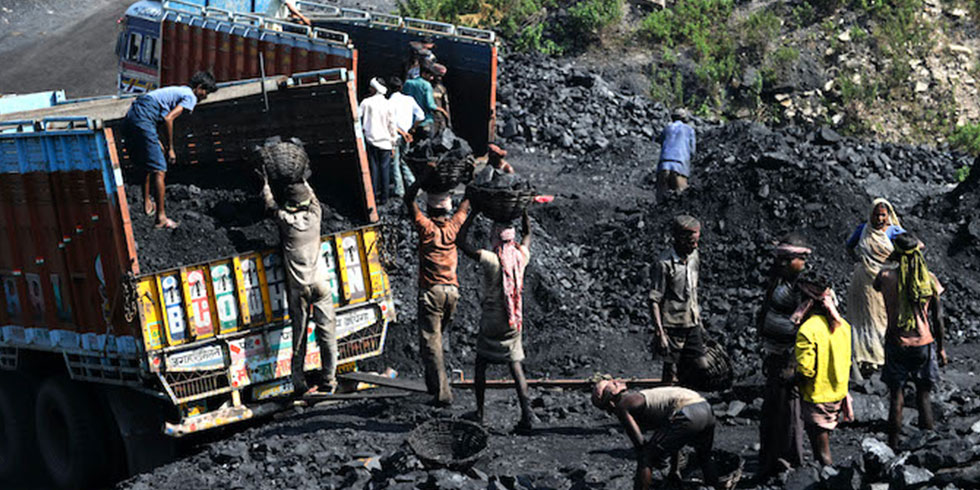According to data from the coal ministry, at least three of the approximately 50 auctioned coal mines in the private sector have become active since February 2020. Since 2019, around 27 coal mines have been operationalized across all sectors.
India will begin exporting coal in 2025-26, according to Union Minister for Coal, Mines, and Parliamentary Affairs Pralhad Joshi, who also stated that importing coal for thermal power production will end in roughly two years.
Joshi was addressing at the start of the seventh round of commercial coal mine auctions and the signing of agreements with winning bidders in the sixth round. The event's chief guest was Union Defence Minister Rajnath Singh.
Joshi noted that with a 14% growth, coal production is forecast to reach a record of 880 million tonnes (MT) this fiscal year, while offtake is expected to reach 900 MT. He also stated that coal production from captive and commercial mines has surpassed 100 MT.
Later, while speaking to reporters on the sidelines of the event, Joshi stated that his announcement was just for non-coking coal. India's entire estimated coal reserve is approximately 3.61 billion tonnes.
"India is transitioning from a net importer of coal to a net exporter of non-coking coal." India imported 90 MT of substitutable coal, which will be phased out by 2025-26 when the country begins to export dry fuel. "With the exception of coking coal, we will stop importing thermal coal," Joshi stated.
The minister emphasised that there will be no blanket prohibition on coal imports because there are imported coal-based power facilities that are specifically constructed. He did, however, assure that if such imported coal-based power plants make the necessary technological adjustments, the government will allot domestic coal to them as well.
With the start of the seventh round of commercial coal mine auctions, a total of 106 coal blocks are currently available. Five coal mines out of 106 are being offered in a second try for the sixth tranche because only one bid was received for these mines. The remaining 101 coal mines proposed in the seventh tranche are 32 new coal mines and 69 rolled over from previous tranches.
The mines being auctioned are spread across coal and lignite-bearing states of Jharkhand, Chhattisgarh, Odisha, Madhya Pradesh, Maharashtra, West Bengal, Andhra Pradesh, Telangana, Rajasthan, Tamil Nadu and Bihar.
The coal ministry also inked agreements on March 29 for 29 coal mines that were auctioned off in the sixth round of commercial coal mines auction. JSW Steel Limited, JSW Cement Limited, Ultratech Cement Limited, Shree Cement Limited, Assam Mineral Development Corporation Limited, Jindal Power Limited, Dalmia Cement (Bharat) Limited, Rungta Sons Private Limited, Ambuja Cements Limited, and Gujarat Mineral Development Corporation Ltd were among those who won bids.
29 coal mines have a total peak rated capacity (PRC) of 74 MTPA. These mines, once operating, are estimated to provide an annual revenue of Rs. 14,497 crores calculated at the PRC of these coal mines and will employ around one lakh people, according to a statement from the ministry.
In response to India's increased electricity demand, Joshi stated that his ministry will ensure that thermal power plants have adequate coal not only during the summers but also throughout the monsoons. The power ministry forecasted peak electricity demand at 230 gigatonnes (GW) in April.
Amrit Lal Meena, the coal secretary, stated that 87 coal mines had been successfully auctioned in various tranches of commercial coal mine auctions so far.
Commercial coal mining was established to increase domestic coal output and to pave the road for energy security. On June 18, 2020, Prime Minister Narendra Modi launched the first phase of the auction of commercial coal mines. This was a watershed moment for the Indian coal industry since it permitted all enterprises to mine coal commercially for the first time, with no restrictions on end use. In addition, the National Coal Index was launched in the country in order to provide a market-linked approach to coal pricing.
"We have also operationalized approximately 27 mines to produce coal since 2019." This covers coal mines owned by the government, different public sector enterprises, and the private sector. M Nagaraju, assistant secretary and nominated authority of coal auctioning, told Moneycontrol that "coal production from commercial coal mines is expected to reach more than 1 billion MT in FY 2023-24."
For the first time in history, the captive and commercial coal mines have exceeded 112 MT.
According to data from the coal ministry, at least three of the approximately 50 auctioned coal mines in the private sector have become active since February 2020. "This is commendable in and of itself, as it used to take up to ten years to operationalize a new coal mine." Now that we have streamlined the processes so much and are offering a 50% incentive to those who get their coal mines ready early, we are seeing new coal mines ready in India in a record 2.5 years," Meena told Moneycontrol.
Joshi predicted that coal would continue to be vital for India's economy, particularly the power industry, until at least 2040.










Add Comment